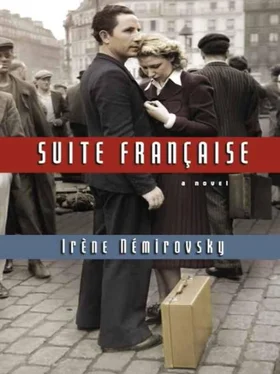Irène Némirovsky - Suite Française
Здесь есть возможность читать онлайн «Irène Némirovsky - Suite Française» весь текст электронной книги совершенно бесплатно (целиком полную версию без сокращений). В некоторых случаях можно слушать аудио, скачать через торрент в формате fb2 и присутствует краткое содержание. Жанр: Историческая проза, на английском языке. Описание произведения, (предисловие) а так же отзывы посетителей доступны на портале библиотеки ЛибКат.
- Название:Suite Française
- Автор:
- Жанр:
- Год:неизвестен
- ISBN:нет данных
- Рейтинг книги:4 / 5. Голосов: 1
-
Избранное:Добавить в избранное
- Отзывы:
-
Ваша оценка:
- 80
- 1
- 2
- 3
- 4
- 5
Suite Française: краткое содержание, описание и аннотация
Предлагаем к чтению аннотацию, описание, краткое содержание или предисловие (зависит от того, что написал сам автор книги «Suite Française»). Если вы не нашли необходимую информацию о книге — напишите в комментариях, мы постараемся отыскать её.
"A book of exceptional literary quality… it has the kind of intimacy found in the diary of Anne Frank."-The Times Literary Supplement
"Heroic… a novel about a nightmare in which the author is entirely embedded."-ANITA BROOKNER, The Spectator
"An exceptionally forceful and frank testimony… a real find. A masterpiece."-L'Express
"Remarkable as the story of the publication of Suite Française is, it will finally be of anecdotal interest compared with the importance of the book. Here is the work of a fine novelist at the top of her form, writing about the fate of her adopted country with a pitiless clarity."-Evening Standard
Suite Française — читать онлайн бесплатно полную книгу (весь текст) целиком
Ниже представлен текст книги, разбитый по страницам. Система сохранения места последней прочитанной страницы, позволяет с удобством читать онлайн бесплатно книгу «Suite Française», без необходимости каждый раз заново искать на чём Вы остановились. Поставьте закладку, и сможете в любой момент перейти на страницу, на которой закончили чтение.
Интервал:
Закладка:
She was standing on a small platform; the classroom had quickly been cleared of its desks; a dozen or so pupils deemed the most worthy had been allowed to come and hear the Viscountess speak. They were scraping their shoes on the floor and looking vacantly into space with their large, dull eyes, "like cows," the Viscountess thought, feeling rather annoyed.
She decided to speak directly to them. "My dear girls," she said, "you have been the victims of our country's misfortunes at such a tender age…
One of the girls was listening so attentively that she fell off her wooden stool; the eleven other girls tried to stifle their riotous laughter in their smocks.
The Viscountess frowned and continued more loudly. "You play your childish games. You seem carefree, but your hearts are full of sadness. What fervent prayers you must offer to Almighty God, day and night, begging Him to take pity on our dear suffering France!"
She paused and nodded curtly to the teacher who had just come in: she was a woman who did not attend Mass and who had buried her husband in a civil ceremony; according to her pupils she hadn't even been baptised, which seemed not so much scandalous as unbelievable, like saying someone had been born with the tail of a fish. As this person's conduct was irreproachable, the Viscountess hated her all the more: "because," she explained to the Viscount, "if she drank or had lovers, you could understand her lack of religion, but just imagine, Amaury, the confusion that can be caused in people's minds when they see virtue practised by people who are not religious."
The presence of this teacher was so odious to the Viscountess that her voice took on the same burning passion that seeing the enemy stirs in our hearts, and it was with true eloquence that she continued, "But our prayers, our tears are not enough. I say this not only to you; I say it to your mothers. We must be charitable. But what do I see? No one is charitable; no one puts other people first. I am not asking you for money; alas, money doesn't mean very much any more," the Viscountess said with a sigh, remembering she had spent 850 francs on the shoes she was wearing (fortunately, the Viscount was the local Mayor and she had coupons for shoes whenever she pleased). "No, it isn't money, it's food I want to send in these packages to our prisoners of war, food we have in such abundance in this region. Each one of you is thinking of your own relatives, your husband, son, brother, father who is a prisoner, and nothing is too much for them; you send them butter, chocolate, sugar, tobacco, but what about the men who have no families? Oh, ladies, think of it, just imagine the state of these poor wretches who never receive any packages, never receive any letters! Come now, what could you do for them? I'll collect all the donations, I'll sort them all out; I'll send them to the Red Cross to distribute them to the different Stalags. What do you say, ladies?"
They said nothing; the farmers' wives looked at the village ladies, who pursed their lips and stared back at them.
"Come along now, I'll start," said the Viscountess sweetly. "I have an idea: we could send a letter written by one of the children here in the next package. A letter that in simple, touching words would reveal their hearts and express their sorrowful, patriotic feelings. Just think," the Viscountess continued in an impassioned voice, "just think of the joy a poor abandoned soldier will feel when he reads those words, when he can almost touch, in a way, the very soul of his country; their words will remind him of the men, the women, the children, the trees, the houses of his dear little home, and as the poet said, loving our home makes us love our country even more. But most of all, my children, let your hearts speak. Do not aim for stylistic effect: forget your letter-writing skills and speak from the heart. Ah, the heart," said the Viscountess, half closing her eyes, "nothing beautiful, nothing great is accomplished without heart. You could put a little flower from the fields in your letter, a daisy or a primrose… I don't think that would be breaking any rules. Do you like that idea?" the Viscountess asked, tilting her head slightly and smiling graciously. "Come, now, I've talked enough. It's your turn."
The notary's wife, a woman with hard features and a slight moustache, said sharply, "It's not that we don't want to spoil our dear prisoners. But what can we poor villagers do? We have nothing. We don't have enormous estates like you, Viscountess, or big farms like the country folk. We can barely feed ourselves. My daughter just gave birth and can't even get any milk for her baby. Eggs cost two francs each, if you can find any."
"Are you saying we farmers are running a black market?" asked Cécile Sabarie who was in the audience. When she got angry, her neck swelled up like a turkey and her face went purplish-red.
"I'm not saying that, but…"
"Ladies, ladies," the Viscountess said softly, and she thought despondently, "Well, there you have it, there's nothing to be done, they feel nothing, they understand nothing, they have base souls. What am I thinking? Souls? They're nothing more than stomachs with the gift of speech."
"It's hurtful to hear you say that," Cécile continued, "it's hurtful to see you with your houses and having everything you want and then to hear you cry poverty. Come on, everyone knows you villagers have everything. You hear me? Everything! You think we don't know you're getting all the meat? You buy up all the coupons. Everybody knows it. You pay a hundred for each meat coupon. If you've got money, you want for nothing, that's for sure, while we poor people…"
"Well of course we have to have meat, Madame," said the notary's wife haughtily, anxiously wondering if she'd been spotted coming out of the butcher's with a leg of lamb the day before (the second one that week). "We don't have pigs we can kill! We don't have hams in our kitchens, tubs of lard and cured sausages we'd rather see eaten by worms than give them to the miserable people in the village."
"Ladies, ladies," the Viscountess implored. "Think of France, elevate your hearts. Control yourselves. Silence these hurtful remarks. Think of our situation. We are ruined, defeated… We have only one consolation: our dear Maréchal. And all you can talk about is eggs, milk, pigs! How important is food? Really, ladies, this is all so vulgar! We have so many other things to worry about. What is really important in the end? Helping each other a little, a little tolerance. Let us unite just as the soldiers in the last war did in the trenches, just as, I am sure, our dear prisoners of war are doing in their camps, behind their barbed-wire fences."
It was strange. They had barely been listening to her until now. Her imploring had been like a priest's sermon you hear without understanding. But the image of a German prisoner-of-war camp, with men herded behind barbed wire, touched them. Every one of these large, heavy women had someone they loved in one of those camps; they were working for him; they were saving for him; they were putting money aside for his return, so he could say, "You really took care of everything; you're a good wife." Each woman pictured her absent man, just hers; each woman imagined in her own way the place he was held captive; one thought of a pine forest, another of a cold room, yet another of fortress-like walls, but each of them ended up imagining miles of barbed wire surrounding their men and isolating them from the rest of the world. The farmers' wives and villagers alike felt their eyes fill with tears.
"I'll bring you something," one of them said.
"Me too," said another with a sigh. "I'll manage to find a bit of something."
"I'll see what I can do," promised the notary's wife.
Madame de Montmort hurried to write down their promises. Every one of the women stood up, went over to the President and whispered something in her ear, because now they were all deeply moved and touched; they truly wanted to give, not only to their sons and husbands, but to strangers, to children on Welfare. However, they didn't trust each other; they didn't want to seem richer than they were; they feared being denounced. There wasn't a single household that didn't hide its provisions; mothers and daughters spied on each other, denounced each other; housewives closed their kitchen doors at mealtimes so they wouldn't be betrayed by the smell of lard sizzling in the pot, or the piece of prohibited meat, or the cake made with illegal flour. Madame de Montmort wrote down:
Читать дальшеИнтервал:
Закладка:
Похожие книги на «Suite Française»
Представляем Вашему вниманию похожие книги на «Suite Française» списком для выбора. Мы отобрали схожую по названию и смыслу литературу в надежде предоставить читателям больше вариантов отыскать новые, интересные, ещё непрочитанные произведения.
Обсуждение, отзывы о книге «Suite Française» и просто собственные мнения читателей. Оставьте ваши комментарии, напишите, что Вы думаете о произведении, его смысле или главных героях. Укажите что конкретно понравилось, а что нет, и почему Вы так считаете.

![Константин Бальмонт - Константин Бальмонт и поэзия французского языка/Konstantin Balmont et la poésie de langue française [билингва ru-fr]](/books/60875/konstantin-balmont-konstantin-balmont-i-poeziya-francuzskogo-yazyka-konstantin-balmont-et-thumb.webp)










